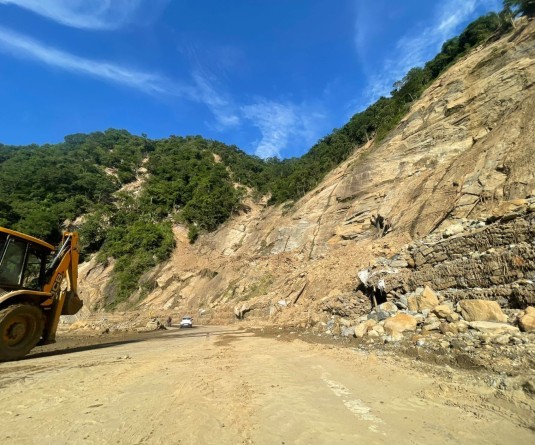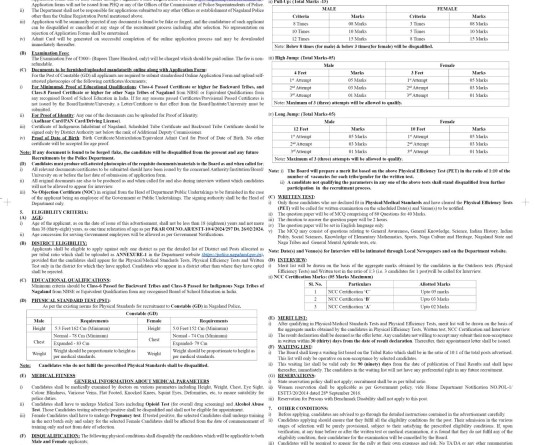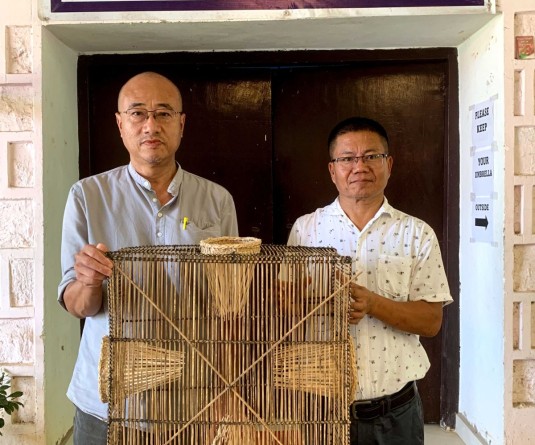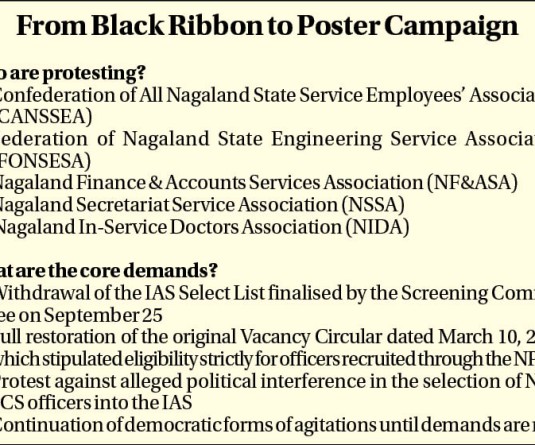Pre sorting unsegregated waste at the solid waste management site in Lerie, Kohima. (KMC Photo)
.jpg)
Needs change in habit and attitude
Alice Yhoshü
Kohima | February 12
As Nagaland struggles to do away with plastics after the State Government issued a ban on plastics last November, the State capital's municipal body has embarked on several strategies to sensitize the public on the ill-effects of plastic, the latest being a handholding effort with the community’s major stakeholders: women.
Know about plastic
• More than 95% of the non-biodegradable waste collected is plastic trash.
• Multilayered Plastics (mostly popular junk food, chips packets, sweets/biscuits wrappers, gums, guthka, etc.)
• Single use plastics/styrofoams (cups, plates, spoons, forks, plastic bags)
• PET Bottles (packaged water and soft drinks)
• Tetrapaks (juices and milk)
• Others like cigarette butts etc.
Role of women
On Tuesday, the Kohima Municipal Council (KMC) organised a sensitization programme with the Angamimiapfü Mechü Krotho (Angami Women Organisation, or the AMK) on plastic pollution and its harmful effects and the role of women in waste management.
The capital town Kohima generates 70-80 metric tonnes of waste daily, of which, 80 per cent is dry waste consisting of plastic bags, cups and plates, water bottles, and thermocol products. The KMC is of the view that while a change in habit and attitude of the public towards plastic use management is crucial, spreading awareness on the harmful effects of plastic pollution are essential towards bringing action on the ground.
According to the KMC administrator Kovi Meyase, the influential role of women in the community is often undermined but if there is any group which can reach the grassroots with anything to do with management and make an impact, it is women. It is with this conviction that the KMC stepped out to tie hands with the AMK to take the message of the need to say ‘no’ to plastic use.
Meyase expressed hope that such collaborative programmes will continue, not just with women groups, but to the church and schools as well.
Toxic chemicals
Retired bureaucrat and founding member of Green Team Kohima, Thangi Manen delivered an in-depth presentation on the harmful effects of plastic pollution on the human population, plants and wildlife. She voiced deep concern that although plastic is a material made to last forever, yet 33 per cent of all plastic- water bottles, bags and straws- are used just once and thrown away. Disposed plastic materials can remain in the environment for up to 2000 years and longer, she stated.
She explained that toxic chemicals leach out of plastics and are found in the blood and tissue of nearly all of us and exposure to such chemicals is linked to cancers, birth defects, impaired immunity, endocrine disruption, fertility and other ailments.
Talking about how plastic pollutes groundwater, Manen stated water shortage is a concern in many parts of the State including Kohima but the water available is in great danger because of leaking plastic and waste. Besides this, she said, burning of plastic in the open air leads to environmental pollution due to release of poisonous chemicals. The polluted air when inhaled by humans and animals affect their health and can cause respiratory problems and cancer, she added.
She also cited that a common sight in parts of Kohima is that streams are converted into drains over time and then jammed with plastic wastes, leading to blocked drainage- which can result in water stagnation thereby increasing the probability of disease spread, landslides, and pollution to the town’s drinking water and paddy fields.
Manen expressed dismay that the Government of Nagaland had issued a ban on single-use plastics in November 2018 but there has been no visible impact to this ban. She felt that follow up to the order needs to be pursed. On the other hand, she also pointed out that the people should not always wait for government directives, and should rather make their voices be heard by the government to act upon what they want, and can do. “No amount of governmental policies will effectively make a difference unless people who create demand for plastic consciously choose to adapt to plastic-free lifestyles,” she said, adding, “We as consumers have the power to drastically reduce plastic pollution by making small personal level changes in our day-to-day lives.”
Waste management
Alice Kamei of the Green Team Kohima who spoke on the role of women in waste management highlighted that the participation of women in all aspects of life is important. She stated that generating waste begins from the household and women play a vital role in managing them. Learning to segregate dry and wet waste is a start, she said while challenging the womenfolk to use cloth carry-bags while shopping as that will help in beating plastic usage.
KMC office secretary Zakie Kiso while highlighting the activities and challenges faced by the municipal body, informed that the municipal body in Kohima has a total workforce of 207, including 69 regular staff, 28 temporary and 110 sanitary workers on fixed pay.
He listed some of the problems and difficulties faced by the KMC on solid waste management as: garbage trucks are as old as 15-18 years and only six are on road, unregulated timing of disposing waste by citizens (before 5 am & after 6 pm), lack of basic waste management awareness, non-segregation of waste at household level, disposal of waste in non-biodegradable plastic bags which the KMC gets about 40-50 thousand daily, improper disposal of waste in compactor/pedestrian twin bins installed at public places, KMC labourers underpaid due to fund constraints, collection of 100% waste also effected by traffic jams, burning of waste by public in collection points/installed bins, floating population from neighbouring villages/towns add more unregulated waste generation/disposal.






